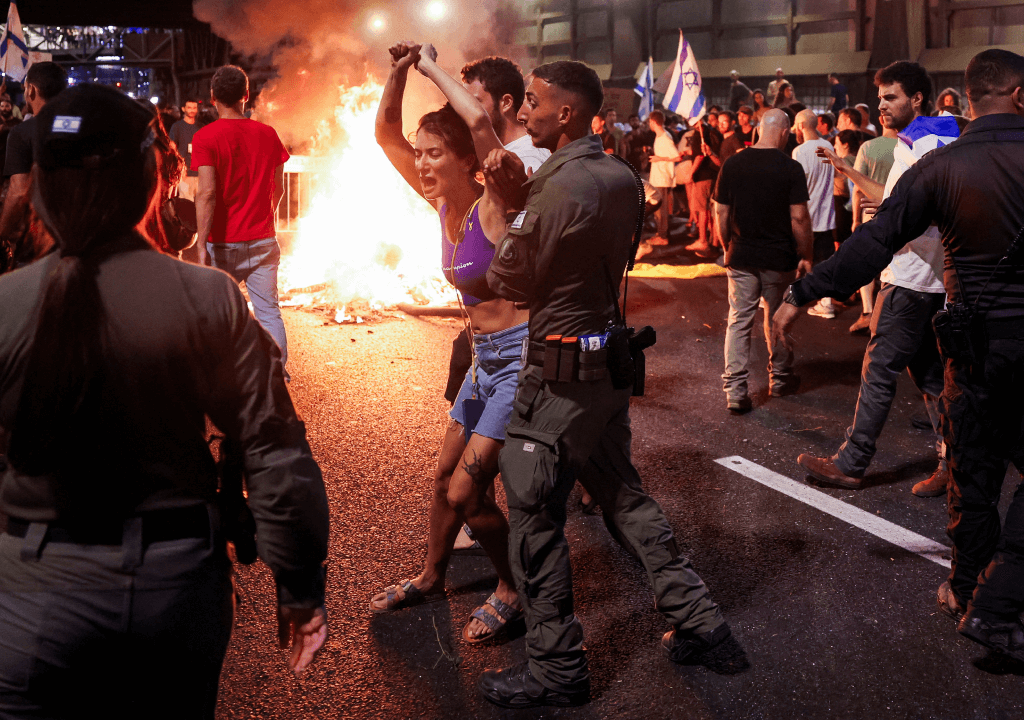As Netanyahu’s government tightens its siege on Gaza and inflames tensions in the West Bank, a profound wave of protests has swept through Israel. On Sunday night, the streets were thronged with thousands of demonstrators, and a general strike was called in a dramatic response to escalating public outrage, particularly following the deaths of six hostages held underground by Hamas. What initially seemed to reinforce Netanyahu’s position – despite a fractured coalition and persistent corruption allegations – has now emerged as a considerable liability, fueling a growing tide of opposition against him.
The discovery of the hostages’ bodies in Gaza over the weekend has intensified the divisions over the war, pushing tensions to their breaking point. In Tel Aviv, Israel’s bustling commercial center, around 100,000 people rallied, while demonstrations also unfolded in Jerusalem, amplifying pressure on Prime Minister Benjamin Netanyahu to secure a ceasefire and bring the remaining hostages home. That night, protesters blocked the Ayalon highway in Tel Aviv, igniting a bonfire in the road near Hashalom and filling the streets with drumming and chanting. Despite the efforts of a few dozen police officers, the protest continued unabated. The nationwide general strike, the first since the Hamas attacks on October 7, was organized to advocate for a deal to free the hostages. It ended after eight hours with a court order mandating that workers return to their jobs.
The findings indicating that Hamas executed the hostages did little to shift the widespread anger directed at Netanyahu and his right-wing coalition for failing to secure a US-backed hostages-for-peace deal with Hamas, which has been under negotiation since late May. Hamas believed that holding the hostages would leverage Israel into conducting talks and releasing their members from Israeli prisons. However, Netanyahu chose to use the situation as a bargaining tool, despite warnings that Hamas might kill the hostages. In a statement mourning the six hostages, Netanyahu blames Hamas for rejecting the deal. Hamas official Izzat al-Rishq, however, blamed the deaths on Israel and the US, citing Israel’s failure to agree to a ceasefire deal that he claimed Hamas had accepted. Rishq did not address how the hostages died or comment on IDF claims of executions.
It seems that the country’s left-wing and center-left factions are increasingly opposed to the war, advocating for a hostage deal that could potentially lead to at least a temporary peace. Announcing the general strike, Histadrut trade union federation leader Arnon Bar-David stated that it was impossible to continue standing by as children are murdered in the tunnels of Gaza. He added that the nation is no longer united and that this situation must be stopped. According to Bar-David, Israel needs to return to normal, as the country is receiving body bags instead of a deal. He concluded that only their intervention might compel those who need to act.
During Sunday night’s demonstration, many protesters felt that the country might have reached a critical juncture. The strike was supported by the Hostage and Missing Families Forum, a group of relatives of the abductees who have been leading the protest movement and calling for a ceasefire deal. However, the right-wing faction views these leftist efforts as making the country vulnerable to Hamas’s demands and future risks.
In October of last year, Hamas executed a brutal terrorist attack on Israel, leading to 1,200 fatalities. Of the 250 hostages captured, eight have been rescued, and over 100 were released as part of a temporary ceasefire deal in November. The recent discovery of six more bodies leaves 101 hostages still missing in Gaza. The IDF has confirmed that 35 of these hostages have died after more than ten months in captivity. The lives of those still presumed alive are highly valuable to Israel, and as protests escalate, political pressure on Netanyahu is expected to mount. If Netanyahu continues to disregard these protests, opposition and anti-Netanyahu sentiment are likely to intensify. The ongoing war, which supports Netanyahu’s coalition government formed with various interest groups, also serves to bolster his position despite the growing unrest.








